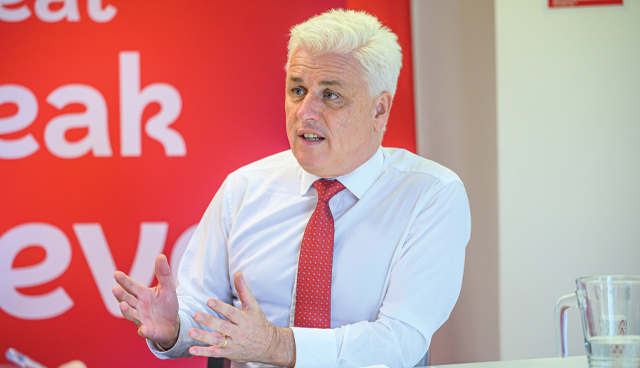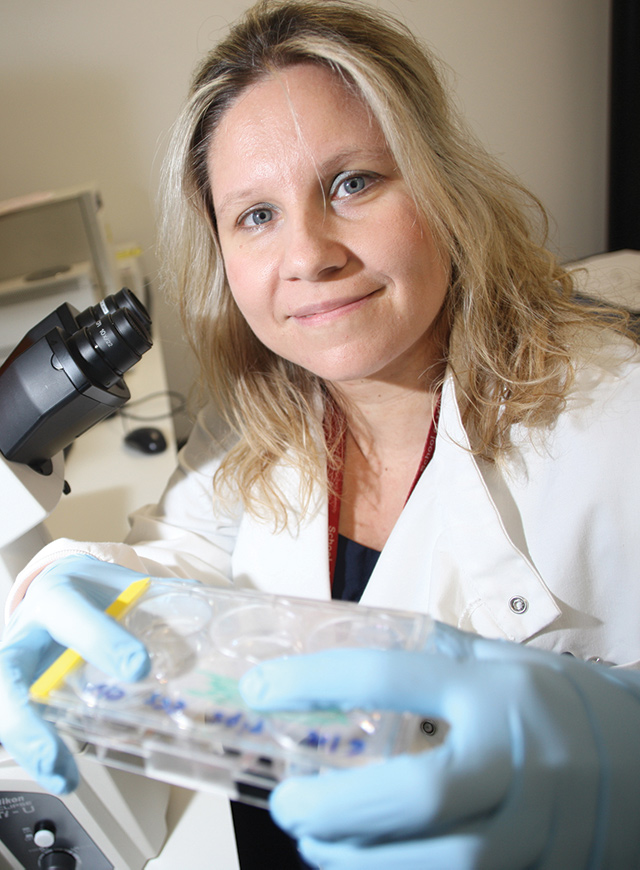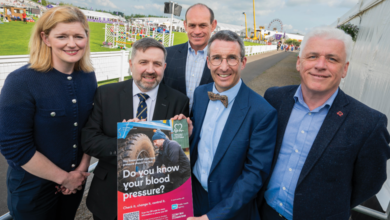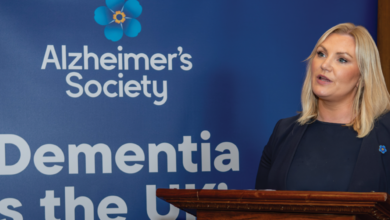Financial support needed for life-saving research

Head of BHF NI Fearghal McKinney outlines the charity’s agile approach to delivering services in the pandemic and the critical need for financial supports for medical research.
People living with heart and circulatory disease are at increased risk of more severe complications of Covid-19.
Recent research in England and Wales has also shown a rise in excess heart and circulatory disease deaths in people aged under 65 since the Covid-19 pandemic began. Figures recorded there show that there have been almost 800 excess deaths in those dying below the age of 65 from heart and circulatory diseases.
Although these figures are not available here, British Heart Foundation Northern Ireland (BHF NI) believes analysis would show a similar trend locally. The charity says that delays in people seeking care, coupled with a reduced access to routine tests and treatments during the pandemic, have likely contributed to the rise in excess deaths. It now warns that figures could get worse due to increasing Covid-19 cases and the winter pressures on health and social care.
The medical research charity has been hit hard by the pandemic.
The devastating impact of Covid-19 means that the BHF’s net income, and resulting investment in new research, is likely to drop by up to 50 per cent this year. The pandemic has caused fundraising to plummet, with events cancelled and charity shops shut because of the lockdown.
Such a sharp fall could have a catastrophic impact on UK cardiovascular research, advances in diagnostics, treatments and cures for people with heart and circulatory diseases and the work the charity carries out locally supporting heart patients and their families.
Head of BHF NI, Fearghal McKinney, says that despite these immense challenges, the charity reacted quickly and decisively to support local people at a time when they needed it most.
“No one could have foreseen the impact the global pandemic would have on all of our lives,” he explains.
“The world changed so fast, but people living with heart and circulatory disease needed us more than ever. We moved quickly to put a number of measures in place to support people. Firstly, our Heart Helpline, staffed by cardiac nurses, was inundated with calls and emails from people confused and fearful about Covid-19 and we acted fast to increase capacity there. Our website is updated daily with up to date information on Covid-19 and what it means for those affected by heart and circulatory disease.”
Making vital services virtual
It wasn’t just providing reassurance and information that became critical. BHF NI was crucial in getting essential cardiac rehabilitation available on a virtual platform.
“Taking part in cardiac rehabilitation is an essential part of a patient’s journey to recovery. Amid the current crisis, cardiac rehabilitation services have been suspended with many staff being redeployed. In the absence of face to face cardiac rehabilitation, BHF have been busy developing and enhancing digital content for healthcare professionals to signpost patients to,” added McKinney.
“We have worked with local clinicians from across the health trusts including Dr Susan Connolly from the Western Trust.
“On our website we have launched a new cardiac rehabilitation hub. This simulates the patient journey and someone can sign up to have eight weekly emails about their progress alongside a variety of resources such as exercise videos, dietary and lifestyle advice, so that patients can continue their cardiac rehabilitation programme, albeit in a very different format.”
The website also features videos from the Western Trust and links to the Our Hearts, Our Minds Rehab service. The charity also launched a blood pressure hub and a heart failure hub helping to support people struggling to access usual medical services.
This agile and innovative action means that heart patients are not losing out on a vital service during the pandemic.

Strategic vision for cardiovascular disease
However, there remains much more to be done.
The decades since the BHF was set up in 1961 have seen a transformation in diagnosis, treatment and care. Back then, more than seven in 10 heart attacks were fatal. Today, at least seven in 10 people survive. While this is hugely positive, one consequence is that the number of people living with heart conditions is greater than ever. People are living longer with heart disease and often have more than one health condition.
BHF NI, convening power and relationships, has brought together a panel of experts, including cardiologists and health officials in a Cardiovascular Disease (CVD) Taskforce. The aim is to identify key priorities to ensure that people with, and at risk of, heart and circulatory disease across Northern Ireland receive the best possible care today and in the future in line with the transformation principles within health and social care.
“Our CVD Taskforce was set up pre-pandemic because we believe we need a new strategic approach to CVD for Northern Ireland and we were perfectly placed to bring the right people around the table to deliver that,” outlines McKinney.
“Services are operating within the context of no new strategic framework since 2014. There has been a lot of change in the health care system since then, not least the transformation agenda and this year as we consider the impact of the Covid-19 pandemic. Heart and circulatory patients are vulnerable now more than ever.”
Protecting the future of medical research
BHF NI have joined the Association of Medical Research Charities and 151 of its members, including Cancer Research UK and Parkinson’s UK, in calling for the UK Government to commit to a Life Sciences Charity Partnership Fund before irreparable damage is done to the sector.
“The Coronavirus crisis will unfortunately have a long-lasting and devastating impact on charities like ours, with our funding for new research falling by up to £50 million this year alone,” adds McKinney.
“It would be a tragedy if we allowed the Covid-19 pandemic to threaten years of hard-fought progress in finding treatments and cures for some of the world’s biggest killers. Next year we celebrate our 60th birthday and we owe it to future generations of patients to keep funding research to find the next breakthroughs. We are calling on the UK government to establish a vital Life Sciences-Charity Partnership Fund to support charity investment in research and help protect world-class research.”
McKinney says the work of BHF NI is needed now more than ever, so their history in progress can continue.
“We currently fund £1.8 million into lifesaving research at Queen’s University Belfast into a range of research projects including investigating the development of heart failure and repairing the heart after a heart attack.
“None of this is possible without the support of local communities through fundraising, charity partnerships and shopping with and donating to our eight shops across Northern Ireland.
“In the early 1960s we gave a grant to Professor Frank Pantridge for his work in the Royal Victoria Hospital. In 1965 he installed his first version of a defibrillator in a Belfast ambulance. Since then defibrillators have been used all over the world saving lives.
“In September we announced one of our researchers Professor Andriana Margariti has discovered a gene that increases the risk of blood vessel damage in people with diabetes who went on to develop heart disease. This is vital, lifesaving work that must continue.”
To contact Fearghal email mckinneyf@bhf.org.uk or visit the BHF website: www.bhf.org.uk






